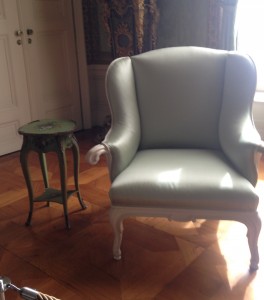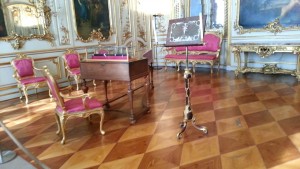Frederick II “Frederick the Great” (January 24, 1712—August 17, 1786) owes much of his success to his father for leaving the Prussian Empire to him at the height of its military power. Though their relationship was strained due to the elder’s strict temperament, Frederick’s father was an extraordinary military leader, also known as the “Soldier-King.”
Frederick William I disliked his son’s love of the arts—philosophy, music, and poetry—and was notorious as “an uncompromising disciplinarian” (Wesch 3). Seeing this love as a weakness in his son, Frederick William I worked to sway Frederick II into becoming a strong, militant ruler.
After the passing of his father in 1740, Frederick II succeeded the throne with great expectations from his people to be just as great as his father before him. It was said of him by the Empress of Austria soon after the country was claimed by Prussian soldiers that he was “the evil man.” He was also known as “the philosopher-king of Sanssouci” and the “prince of peace” (Wesch 3).
“With his passion for French art and culture he sought out the company of French men of letters and philosophers, notably Voltaire, who lived in Sanssouci for three years” (Mader, Dohrmann, and Arndt 2).
While Louis XIV of France professed himself to be “the State,” Frederick II avowed that he was “the first servant of the State” (Wesch 3). He himself was very involved in legislation. He passed new decrees daily and personally looked after his own affairs: architectural projects and the military advancement.
Frederick II was known as “Frederick the Great” because of his military skill, expanding the Prussian Empire to the height of its power, but in his old age, as he was suffering from physical ailments, he became known as “Old Fritz.” Frederick and his wife, Elisabeth Christine of Brunswick-Wolfenbüttel-Bevern, had no children, so upon his death, the throne was left to Frederick’s nephew, Frederick William II (Wesch 3).
What is most interesting about Frederick is not just his ability to advance the Prussian Empire, but the combination of his military prowess and his love for the arts. Frederick played the flute, designed his own summer home, and spoke French better than he did German, his native language (Held and Posner 387).
[** Photo 1: Graff, Anton. Portrait of Friedrich II. 1781. Oil on canvas. Charlottenburg Palace, Berlin.]


